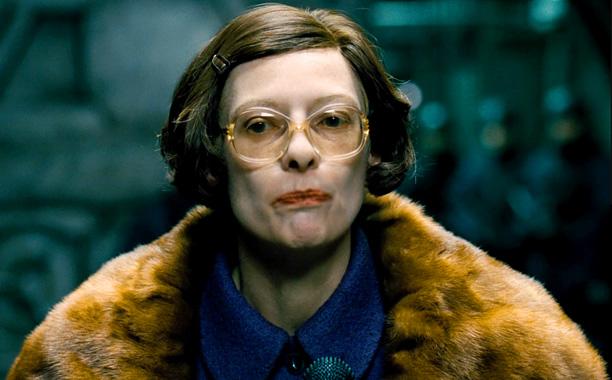
Labeling a film ‘ahead of its time’ before allowing it to breathe in the collective consciousness can be a bold endeavor. All that can be extruded are the themes and motifs working towards the possibilities of a brighter or more dismal future. Who are we, where are we going, and why?
It is true that art reflects life and life reflects art to the extent in which our society and technology will allow. It may be impossible to know what will come after the postmodern fashions. Such as self-referential quips, unproductive cynicism, and the hodgepodge reproduction of films. But filmmakers are sometimes successful in surveying the political, moral, and technological landscape. They are in turn able to make a judgment about where we are heading as a society. A few of these filmmakers are successful in their predictions of tomorrow. There are even fewer filmmakers who may actually influence a better one.
So when the primates are done smashing bones into weapons and flinging them towards the heavens. Towards the infinite space where an orbiting satellite houses a nuclear weapon ready to strike at any moment. Let us take that step towards the black monolith, through the movie screen, the Stargate of tomorrow. Where we reflect on all our fears, desires, hopes, and dreams. We may come out the other side reborn and headed towards a new and better future.
10. Ready Player One (2017)
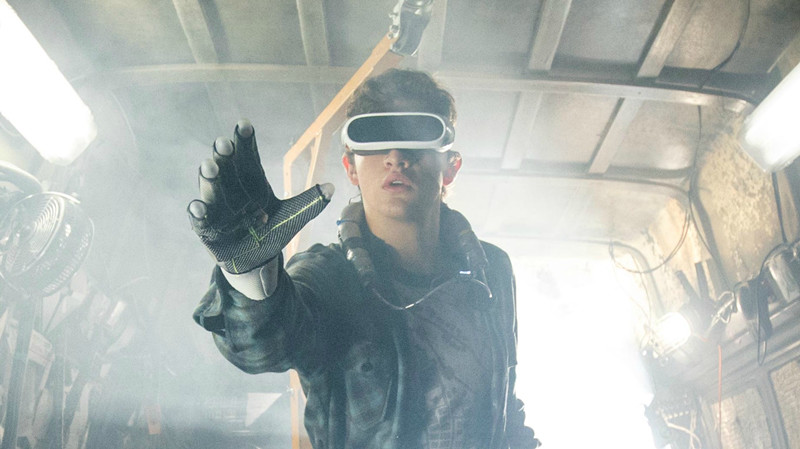
Ready Player One, on the surface, is a fun, nostalgic, surf across the future gaming platform known as the OASIS. However, underneath is a world that has sacrificed quality of life for entertainment. A world where it is unclear whether gaming is an escape from the poverty of the world or a contributing factor. It is also a future where the last free frontier is in jeopardy of regulation from a heartless corporation known as IOI.
A shadowy industry who will stop at nothing to control and miser their way to the top of the leaderboard. This kind of future not only seems possible, it feels like this version of 2045 could actually be just around the corner.
The film was directed by Steven Spielberg, the patient zero of 80’s and 90’s movie nostalgia, and was based on a book by Ernest Cline who also helped pen the script. While the film and book do diverge heavily in plot detail and character, they both still retain a core relevant question. Who is going to control this monster? Will it be the corporations, the government, or the people? The movie’s bet is on the people. But only time can tell which hands will stake their flag into the vast internet landscape. Or perhaps a virtual gaming platform some venture capitalist billionaire with an affinity for 80’s and 90’s culture decides to create.
9. Blue Ruin (2013)
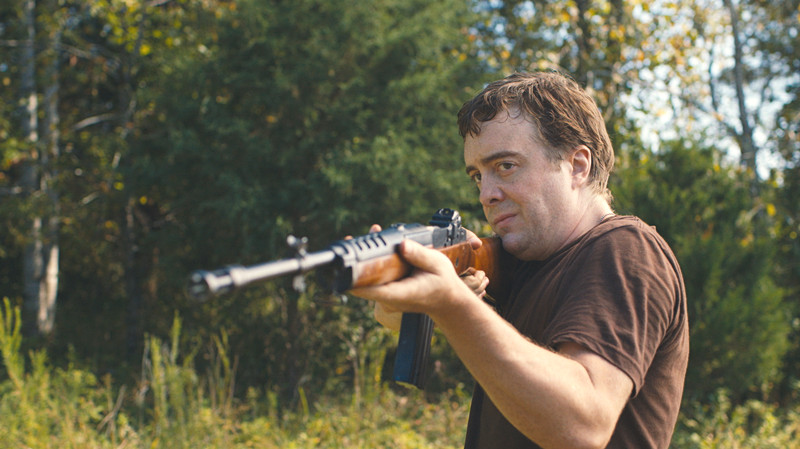
Films don’t need a futuristic setting or a huge budget to convey their message to a new generation. They can do it successfully through their unique moral perspective that turns the classic revenge tale on its head. Blue Ruin, written and directed by Jeremy Saulnier, does just that, the film is brutal, stark, simple, and illuminating.
The film starts as any revenge tale might. Although the audience is thrown toward where the end of the second act might be in a typical film of this genre. The main character Dwight, whose life is in a state of dormancy, quickly finds out about the release of the man who killed his parents. What follows is a back and forth downward spiral leading toward the ruin of two families. It is a film that shows the road of retaliation leads only to futility and violent ends.
Moreover, it is a fascinating commentary on how family ties can become toxic and how estrangement may bring peace. This works in the film on a microcosmic scale, but when thought of at a nationalistic macrocosmic level, this small film shines brightly as a cautionary tale for the ages.
8. First Reformed (2018)
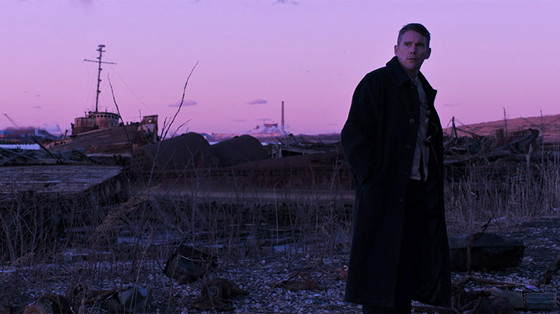
Many will note the similarities between First Reformed, written and directed by Paul Schrader, and Taxi Driver. First Reformed and Taxi Driver, also penned by Schrader, work on many levels but at their core are films about men who want to change themselves. When they inevitably fail they in turn attempt to change their environment. The madness of having to conform to the madness of the world causes these characters to in turn go mad.
First Reformed gets down to a more specific and perhaps more relevant issue facing our future, however. Schrader explicitly confronts several issues including environmentalism, corporate corruption, and religion. The Christian Church is seen here as an antique of a time where it was once a powerful force for change. Here it is shown laying down to corporate financing and getting caught up in political nonsense.
There is a scene in the film in which the main character Toller is showing a class of children around the church. He bends down and lifts up a floorboard revealing a space in which slaves would come for refuge. It is this dichotomy Toller faces. A holy place, a force for good, a congregation who helped the oppressed in spite of the social and political climate. Now, it is unrecognizable.
First Reformed may never get the appreciation Taxi Driver has garnered into the annals of film history. But it certainly is just as rich, layered, and forward thinking.
7. Okja (2017)

Often times films stir up controversy because of their subject matter. Okja received boos even before the title hit the screen at the Cannes film festival. But this was not due to the film’s subject matter. It turns out all the heckling and commotion was because the film was distributed by the streaming service pioneer Netflix. This may seem insignificant now but is a turning point for how an entire market will be and actively is shaping the film industry. This gives Okja just one of many points gained towards the ‘ahead of our time,’ label.
Okja, directed by Joon-ho Bong, is a dark comedy satire about a girl named Mija and her pet super pig, Okja. Things take a turn for the worse when a food industry giant wants to harvest and exploit the super pig and thousands of others just like her. The film is both funny and poignant. It perfectly satirizes the cruel and filthy practices of mass producing food from animals. And makes us question this unsustainable demand going forward.
6. Ex Machina (2014)
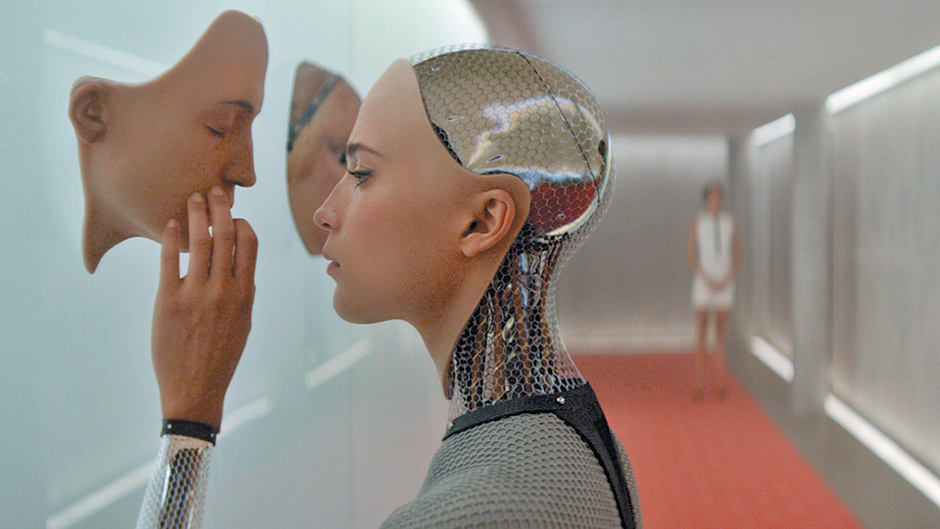
Quantum computing, Ray Kurzweil, Google Alphabet, Deep Mind, robots discussing or hopefully joking about human farms. Let face it, AI is just around the corner. From the premonitory writings of Issac Asimov to the smoke-filled interview with Elon Musk, everyone has their concerns about this technological revolution. But no one has any idea how to control it or even if they want to. Perhaps the answer is to integrate with it and become apart of the singularity. These are big existential questions that are becoming an immediate concern.
Ex Machina, written and directed by Alex Garland, is a compelling and realistic look at this issue while being aware of the technological climate we currently inhabit. The film is grounded and gives a very direct and focused look at how the first AI machine may perceive their creators.
Creators who primarily want to control and monitor their every behavior. The film also offers other layers such as religious, spiritual, and existential themes which are satisfying to explore as well. Ex Machina is a thought-experiment and character study that needs to be looked into and thought deeply upon before we make a heavy-handed push towards creating the next consciousness. A consciousness that will inevitably supersede our own.